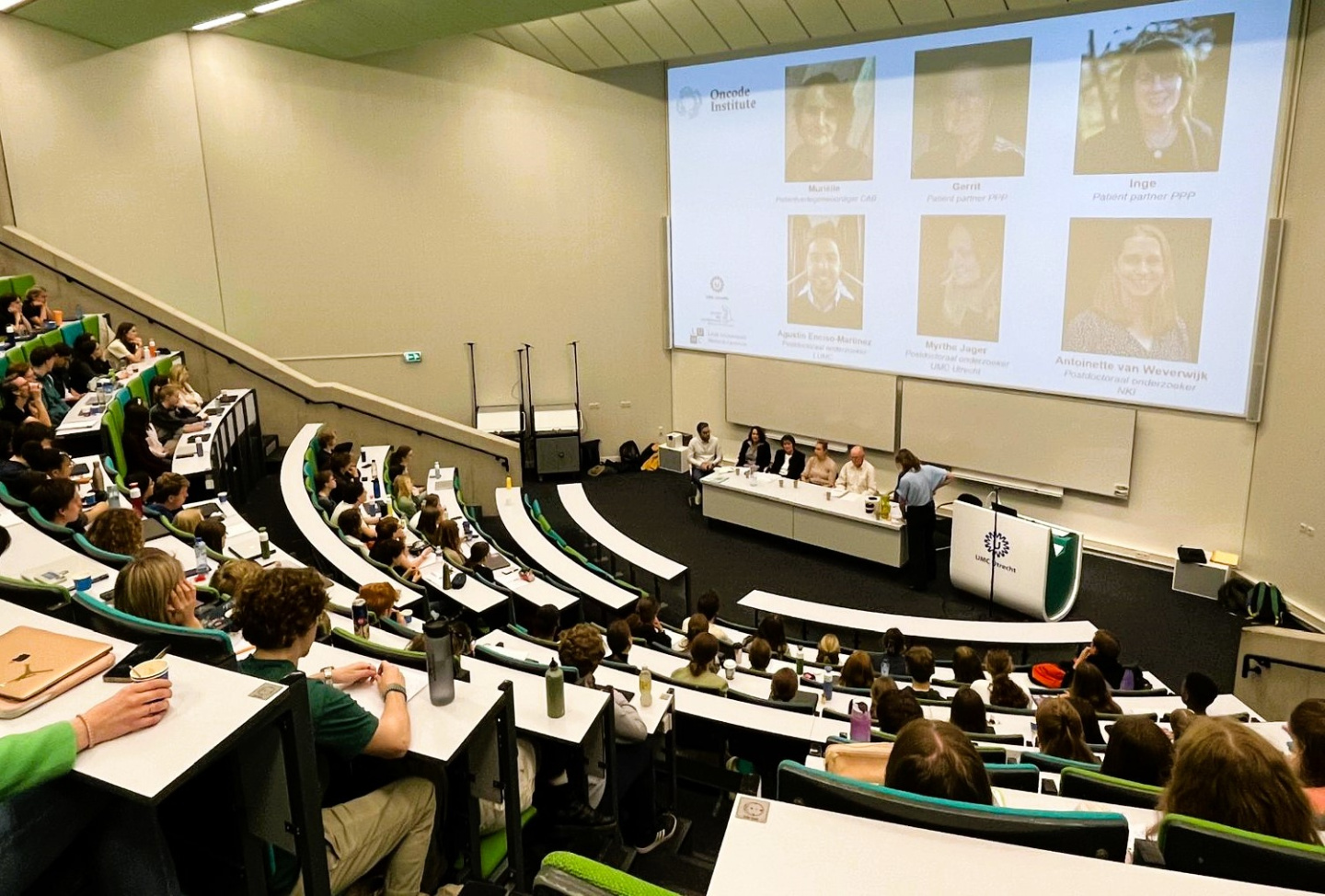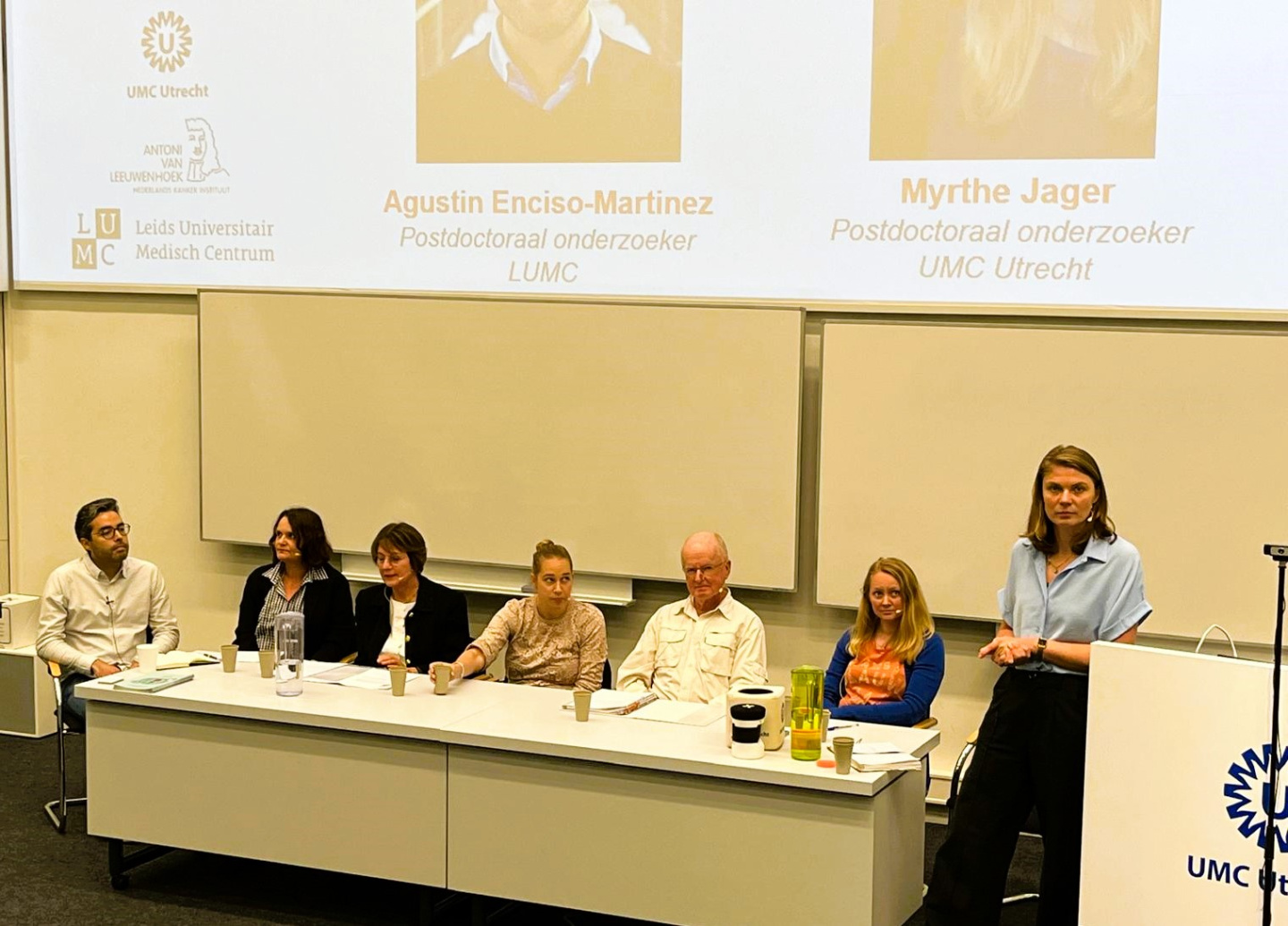On May 27, 2024, Oncode Institute's Patient Engagement Programme played a key role in the 'Eye for Impact' bachelor course at the University Medical Center Utrecht. This course aims to broaden biomedical sciences students' perspectives by taking them out of the lab and showcasing the societal impact of their work through interactive sessions with lawyers, philosophers, ethicists, and patients. It offers a unique platform to integrate patient engagement into basic research. This year's event attracted a large audience of 175 eager students, researchers, and patient representatives, creating a vibrant and interactive learning environment.
In a comprehensive lecture delivered by Oncode’s Program Manager, Colette ten Hove, students gained valuable insights into the synergy between patients and researchers. They experienced this collaboration firsthand during a dynamic panel discussion moderated by Sevgi Fruytier from the Athena Institute at VU Amsterdam. During this session, patient representatives Inge Reus, Muriëlle Sark, and Gerrit Oostenveld captivated the audience with their heartfelt stories of diagnosis, treatment, and their current roles within the Oncode Patient Perspective Programme. Their openness and honesty provided a profound sense of reality, reminding students of the ultimate goal of their research: improving patients' lives.
Complementing these personal stories, Oncode researchers Agustin Enciso-Martinez, Myrthe Jager, and Antoinette van Weverwijk shared their professional experiences. They illustrated how patient insights have directly influenced their research, offering concrete examples of how understanding patient experiences can lead to significant changes in research approaches.


"Our work can feel quite abstract at times," Myrthe explained. "That’s why we're so excited to be part of this program. Patients sometimes become just numbers in a table, and we really want to reconnect with the human side of what we do. Interacting directly with patients reminds us of the true purpose behind our work."
"As patients and researchers, we share a common goal—to beat cancer," Agustin added. "If we don’t communicate, we miss a crucial opportunity to accelerate research, understand patient priorities, and ensure our work aligns with what truly matters to them. By giving patients a voice, we empower them, creating a win-win situation for everyone involved."
The interactive nature of the session allowed students to ask questions and engage directly with the panelists. This dialogue bridged the gap between theory and practice, showing students the real-world implications of involving patients in research. The lecture had a profound impact on the students, transforming their initial skepticism into a deep appreciation for the importance of patient perspectives. They discovered how patients can significantly impact research, often leading to surprising and valuable outcomes. They also recognized the crucial importance of open communication and collaboration, which greatly enriches research and fosters mutual understanding. Finally, they appreciated how patients bring new perspectives and insights, often resulting in unexpected and positive turns in the research process. These insights underscore the power and necessity of patient participation for scientific advancement.
One student remarked, "At first, I questioned how patients could really contribute to research—how would they engage with the study? How much knowledge do they have, and would it be enough to provide meaningful input? It was a real eye-opener for me to hear of so many examples where patient involvement actually improved the research. As a researcher, you’re not the patient, and patients have a different perspective. Ultimately, you’re doing the research for them, so why wouldn’t you involve them?"
"I’ve often wondered: why do we so rarely stop to think about who we’re doing this research for, in the lab or in our daily work?" Sevgi reflected. "Patient involvement is an elusive concept, unlike biomedical research, which follows established protocols and structured methods. It’s much more relational—a collaboration between people that can take many forms and adapt to how we conduct our research. But it can also have a profound impact, challenging the way we do things and sometimes even turning everything upside down. Integrating the patient’s voice into our processes can transform our approach, making it more patient-centered and impactful."
For the patient representatives, participating in this course is about more than just sharing their stories. It’s about inspiring future researchers and uncovering blind spots in current research approaches. Inge Reus reflected on her experience: "Of course, it is emotional to speak about my illness, but it gives me positive energy. Meeting such enthusiastic, young, driven students gives hope and confidence, instead of fear and despair."
Overall, the event demonstrating the power of patient engagement in enriching scientific research. It may inspire a new generation of researchers to consider the patient perspective, ultimately fostering a more inclusive and impactful approach to biomedical research.
Patient engagement at Oncode Institute
Despite all the progress that has been made, there are still many blind spots in cancer research when it comes to including the perspective of patients. Through the Oncode Patient Engagement Programme researchers are stimulated to integrate the perspective of cancer patients into their research. Engaging with cancer patients offers a chance to access first-hand knowledge, and by that, to improve research through novel ideas, perspectives, and discussions. Curious about the ways Oncode Institute involves patients in research? Get into contact with Colette ten Hove to find out how you and your lab can get involved.
Text by Colette ten Hove